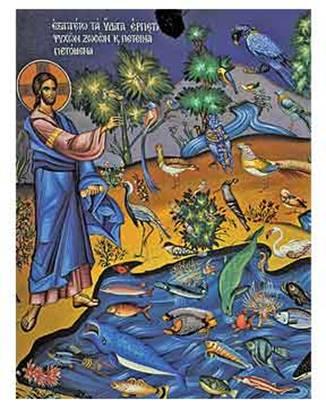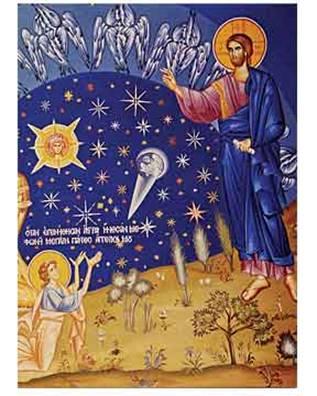Creation
CREATION
Possible Lesson Plan:
- Open with prayer.
- Scripture reading: Genesis 1 & 2. One way to help the students meet the factual objective for this lesson would be to have a large list of things on the board. As they read, have them categorize the things according to the day they were created. Alternately, have the teens compare and contrast the two creation stories (Genesis 1 and Genesis 2). Why are there 2 stories? How do the two different accounts enhance our understanding of Creation?
- Service references: On Christmas, the Nativity, Genesis 1:1-13 is read, as the hymns sing, “Every creature made by Thee offers Thee thanks. The angels offer Thee a hymn; the heavens a star; the Magi, gifts; the shepherds, their wonder; the earth, its cave; the wilderness, the manger…” But, the cross is also prefigured by the tree of life in the vespers of the Feast of the Elevation of the Holy Cross: “The Tree of true life was planted in the place of the skull…” Canticle three of the Canon sung on Holy Saturday matins beautifully portrays the groaning of creation, “When the creation saw Thee hanging in Golgotha, who hast hung the whole earth freely upon the waters, it was seized with amazement and it cried: ‘There is none holy save Thee, O Lord.’ And again, “Today a tomb holds Him who holds the creation in the hollow of His hand; a stone covers Him who covered the heavens with glory…” But Creation is not lost, the Resurrection is prefigured by the Sabbath on which God rested, “For this is the blessed Sabbath, this is the day of rest, on which the only-begotten Son of God rested from all His works…He kept the Sabbath in the flesh; and returning once again to what He was, through His resurrection He has granted us eternal life…”
- Discussion and application:
Where did God come from? What’s the difference between Creator and created? Many Eastern religions have elevated all things to an undifferentiated oneness – leading to the pantheistic view that all is one and all is divine and therefore all is valuable. How is this different from the Judeo-Christian perspective? (that God created everything and therefore everything has value)
What puzzles you about Creation? We’ll discuss evolution more fully under Noah, but Creation is an unpopular belief in today’s world, while it was the dominant belief 100 years ago. How can you explain the six days? What about the order of creation? Does it “make sense”? Does 60 million years make any more sense?
What about our relationship with the environment? This is the first lesson of the new liturgical year; the first day of the new year, September 1, is designated as environmental awareness day. What environmental issues are discussed in school? (water pollution, endangered species, acid rain, global warming, air pollution, rain forests; let the students brainstorm) How is man different from the rest of Creation according to Genesis? (He was created in the image of God.) Does this give us special responsibility? What attitude do many people have today toward God’s Creation? How does this differ from the ideal? Do we have a good “record” in our care for the earth? What would be an appropriate response to having “dominion” over the rest of Creation? How have you personally treated God’s Creation? What can you personally do to change your relationship to God’s Creation?
- Close with prayer: Have each student choose a particular part of the created world they appreciate to thank God for and a particular action they will change to benefit the rest of Creation.

